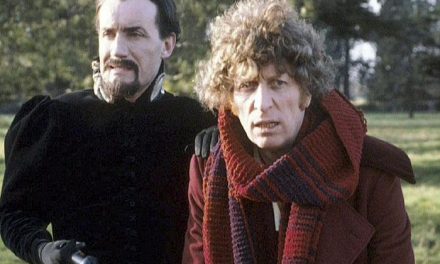When I was younger, I used to plan my weeks around those Sunday night episodes of The Six Million Dollar Man. After all, this was back in the days before VCRs, DVRs, and internet downloads, when “Must See TV” took on an entirely different meaning. If you missed your favorite show, you were pretty much in the dark until the summer reruns. At best, you could listen to your friends talk about how cool it was and wallow in your regret over the distractions that made you lose track of the time. So, on Monday morning, I was already figuring out the best way to “clear my schedule” from the homework or the family commitments that might keep me from finding out if Oscar Goldman was a Fem-bot.

In this “golden age” of television technology, however, those kinds of stresses should no longer prey upon us or our plans for the week. Our DVRs know us so well that they can record our shows even when we forget. Missing the actual moment that a television show or an episode airs should be less of a cause for concern because we can watch and re-watch it whenever we want. The time and timing of the program increasingly should be meaningless. As the ad for one satellite service implores us, “Don’t watch TV. Direct TV.” We are (or should be, if this technology and these ads have any validity,) becoming our own television programmers, our own network executives. The scheduling of our favorite shows now can, technically, revolve around us, instead of the other way around.
And yet, for all of these advances and for all of the various viewing options that are at our disposal, the timing of the television moment, that original moment when the episode first airs, when the sporting event actually takes place, when the comedy hour goes out live, still matters and is still laden with some almost magical, mystical significance that immediately demands our undivided attention. There are still shows and episodes that we want to see as soon as we can and television moments that we want to experience and be a part of because they have a meaning and a value that exists in their timeliness.
A number of CST posts as of late have revolved around specific television moments and clearly speak to the importance that the authors placed upon them, again an interesting fact in light of how our viewing habits probably are changing. In his January column, devoted entirely to “The Television Moment,” Steven Peacock described how certain moments had, paradoxically, “provoked both an instantaneous response and […] lingered in the mind.” In March, the first episode of the new season of Mad Men became the occasion for posts from Kim Akass and David Bianculli. While David lamented how creator Matthew Weiner’s call for critical silence had “literally [left him with] not much […] to say,” Kim admitted that she was “mad as hell” about not being able to take part in “those global watercooler moments” that would inevitably take place in the wake of the airing. Like the television episodes themselves, these columns were “of the moment” and particularly significant because of their timely nature. In Kim and David’s case, their columns were deliberately posted prior to the Mad Men season opener, at that point in time when they would have had the most relevance.
In this regard, these commentaries reflect the importance of context, and this is something that, outside of Mr. Peabody’s Wayback machine, no computer chip or remote control rewind can ever hope to recreate. As Steven insightfully noted in his essay, the television medium itself is inherently characterized by its temporality: “the ephemeral nature of the TV transmission is ever-present, the moment always disappearing even as it is shown, potentially lost the minute it ends.” For all that technology has done to help us recall the show with all of its commercials and station breaks intact, we cannot recall the actual moment in its contextual entirety; like the initial transmission, it, too, is lost as soon as it ends. Every television show that airs at the same time is a part of and contributes to it, along with all of the blogs that post updates, all of the movies that are released or are still running, all of the news stories that break, all of the songs that are playing on the radio, and pretty much anything else that occupies the same cultural time and space with it. Inasmuch as the global watercooler is everywhere, if you miss the moment, you do not just miss out on a quick drink; you miss out on the chance, even the right to engage the community and the discourse, to pick up on the references and make sense of the responses, to see how the puzzle piece fits into the ever-expanding picture. In some ways, all that technology and the perpetual transfer of information have done is to make this constant loss all the more apparent and perhaps, ironically, to shrink the window of the moment’s relevance, so that it is, in the words of a popular cell phone ad, “so twenty-seven seconds ago.”
While I certainly have enjoyed catching up on shows by watching an episode or two on DVR or a season or two on DVD, I must admit that that enjoyment is tempered by the fact that I am, essentially, coming late to the conversation. (As a case in point, I must refer to my viewing experience with Lost on DVD. In a time differential that Darlton might well have appreciated, the Oceanic Six were returning home for me, just as Jack and his cohorts were taking Flight 316 back to the Island for regular viewers of the series.) In these instances, my interest is piqued either by the conversation that I want to maintain or the conversation that I am not a part of but want to join. In either case, the train has already pulled out; I am just hoping to catch up with it at a later stop. Since I will see these episodes under different circumstances and within a context that is different than the way that they originally appeared (even if that is only a few days or a week later), these viewings largely become my way of keeping pace with the community, or they constitute my initiation into the community for the future. They work as an investment for the moment and the context to come, a moment and a context that will, hopefully, have more meaning for me as someone who now knows about what happened previously. But they cannot replace the thrill, the anxiety, the impact, the meaning of the original moment, of seeing Dexter Morgan finding Rita in the bathtub, of watching Vic Mackey in the interrogation room at the end of The Shield, of being there when The Sopranos suddenly “cut to black.”

Regardless of how our television experience evolves or how “on demand” and individualized it becomes, to the extent that there will always be that initial moment when the episode first becomes available and when people first get the chance to see it, consume it, and wash it down with some H20 and some fluid conversation, the television moment will always matter. And, in order to be a part of that conversation, we will, in one way or another, adjust our schedules at the start of the week so that we can be there, at the moment when it happens.
Douglas L. Howard is Chair of the English Department on the Ammerman Campus at Suffolk County Community College, editor of Dexter: Investigating Cutting Edge Television (2010), and co-editor of The Essential Sopranos Reader (2011) and The Gothic Other (2004).




